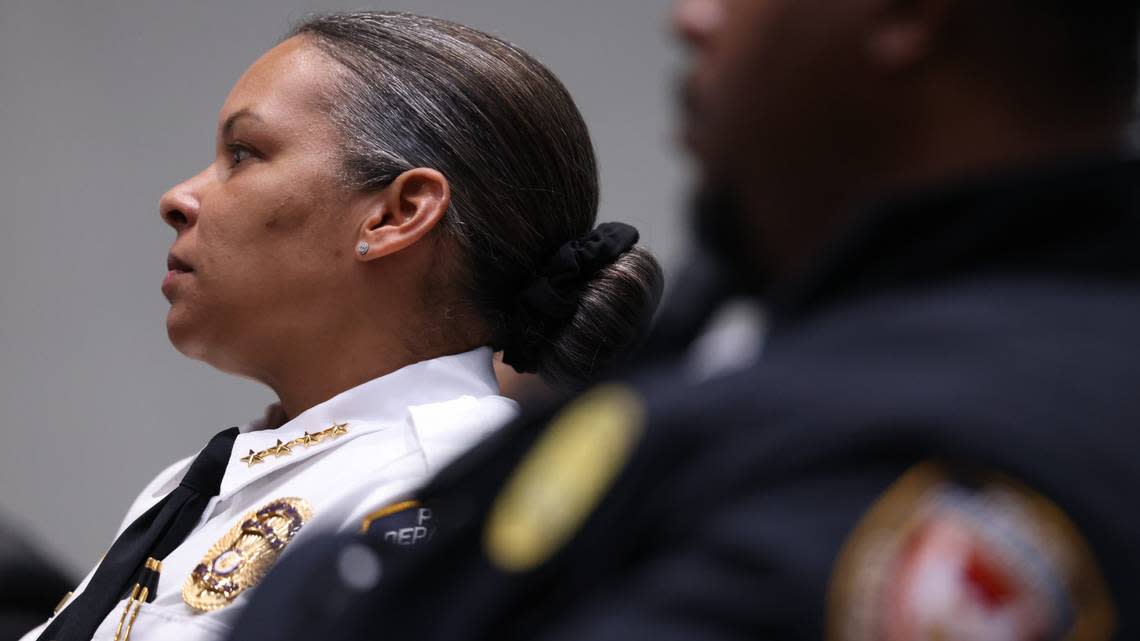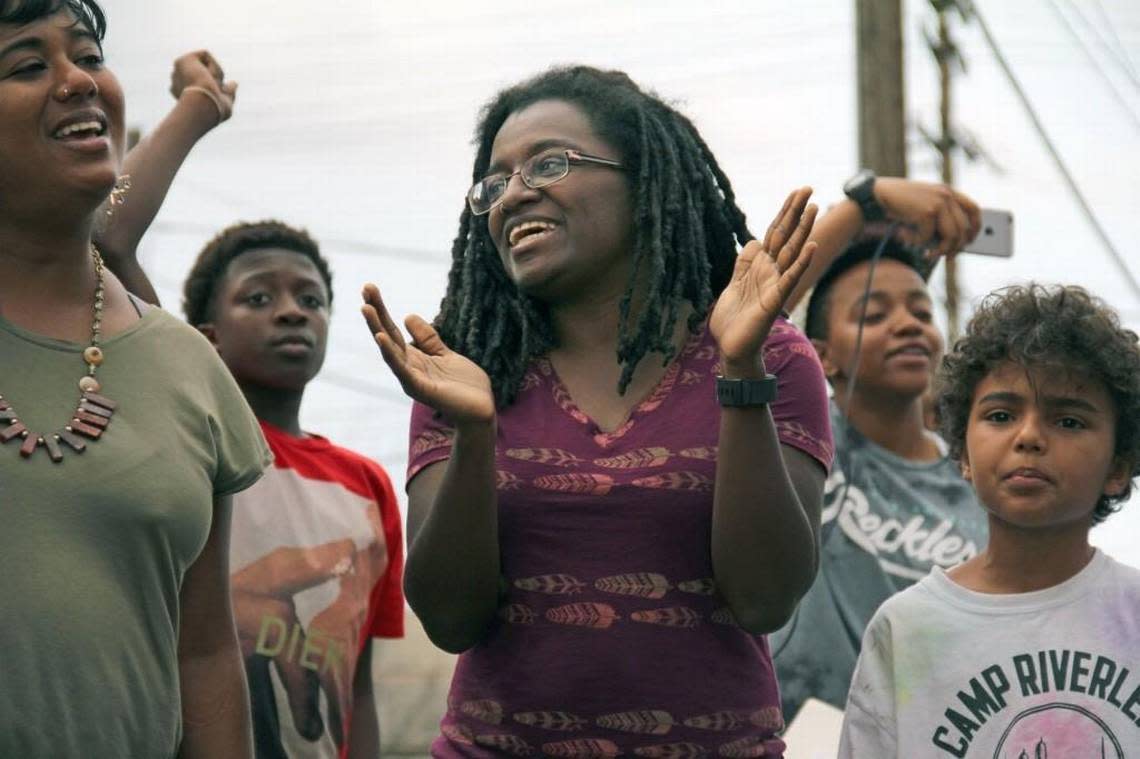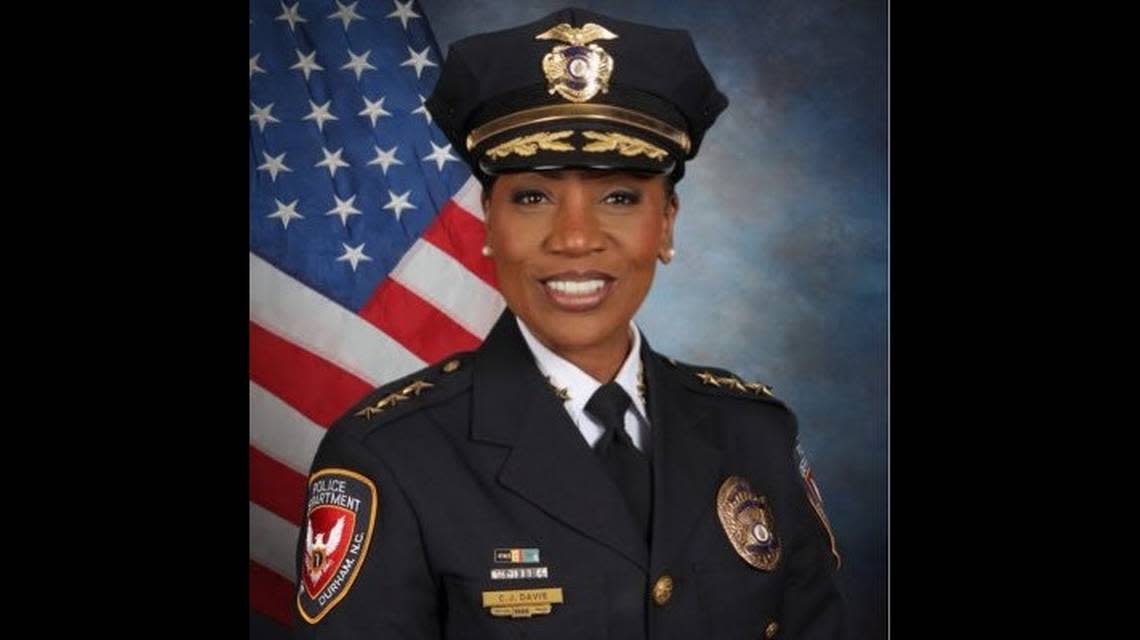One Durham police team stops 80% Black people. City Council member asks why.
More than 60% of the Durham Police Department’s traffic stops every year are of Black people, according to state data, and on one team, that percentage is even higher.
The department’s Crime Area Target Team patrols areas where there’s been a violent event like a shooting and retaliation is likely.
Part of that patrolling involves making traffic stops, most often for equipment violations like a busted tail light or expired tag. The team made 1,390 traffic stops between its inception in April 2022 and December, according to an internal memo.
Black people, most of them men, accounted for 81% of the team’s stops.
Census estimates say Durham’s population is about 37% Black.
The department declined to make Police Chief Patrice Andrews available for an interview, saying she would discuss the team’s activity in City Hall when she gives the quarterly crime report Feb. 23.
She told the City Council last year that the team’s work was about “recognizing that the problem is the place, not the people.”

City Council member Jillian Johnson told The News & Observer she has concerns about the unit and believes it should be disbanded.
“That’s sort of a wide-net policing strategy, you know, just go into a neighborhood, stop as many people as you can,” Johnson said. “And that’s really not the kind of policing we’ve been trying to do in Durham for the last several years. We’ve really been trying to focus more on the people who are responsible for violent crime.”
City Council member questions ‘wide net’ policing
The CAT Team — as it’s called — was started in the wake of a December 2021 shooting in east Durham that left two teenagers dead and four others wounded.
“We had to do something,” Andrews told the City Council in November. “Essentially we handpicked officers that we knew would not only be responsive to the needs of our community, but also would be able to focus on crime trends that were occurring.”
Johnson questioned Andrews about the CAT Team at the meeting, the last time Andrews appeared in the council chamber.
“What are their daily activities like?” she asked at the time.
“They are required to get out of their cars. They are required to talk to our neighbors. They are also required to effect traffic stops knowing that statistics and data shows us that these guns are getting from place to place,” Andrews said. “Same gun, different parts of the city, used in multiple crimes.”
The CAT Team’s traffic stops account for about 20% of the Durham Police Department’s total traffic stops since it began operation.
The department has been stopping fewer people overall since the COVID-19 pandemic began, clocking 9,105 stops in 2022, a 39% decline from 2019, according to the State Bureau of Investigation. That’s due in part to staffing shortages, according to an internal review of traffic-stop data.

“The numbers that indicate racial disparities in traffic-stop data have always been with us,” Mayor Pro Tem Mark-Anthony Middleton said. “We’ve been working on this issue for years in Durham.”
Most people the CAT Team stopped were let go with a verbal warning, though 23% of people were searched, weapons being seized in 38% of those searches.
Both Middleton and Johnson said they will have questions about the CAT Team when Andrews comes before them Feb. 23, though the City Council doesn’t have direct oversight of the police chief. The council hires the city manager, who hires the chief.
“Our role is really to make our make our wishes and opinions and policy preferences known to the city manager,” Johnson said.
Specialized police units scrutinized
Specialized policing units led by C.J. Davis, Durham’s former police chief, whose tenure in Memphis has been rocked by the police killing of Tyre Nichols, are attracting national scrutiny.
Members of the SCORPION unit, a specialized Memphis police team targeting violent offenders in high-crime areas, were among those fired and charged with murder in Nichols’ death.
Davis initially defended the SCORPION unit, but last weekend disbanded it amid what she called “a cloud of dishonor,” according to the Associated Press.
Middleton said he doesn’t want what happened in Memphis to be conflated with policing in Durham.
“What I know about Chief Davis and Chief Andrews is that they are unafraid to snatch badges,” Middleton said. “What we saw in Memphis were criminals with badges and no matter what unit those officers, or former officers, would have been in, they would have been problematic.”
In her five years in Durham, Davis resurrected the city’s gang unit and oversaw its expansion. The CAT Team’s work is meant to complement that of the organized crime division, Andrews said in November.
Before taking over in Durham, Davis spent three decades at the Atlanta Police Department, during which one of her responsibilities was overseeing the notorious RED DOG Unit, dissolved after public outcry a decade ago, according to local reporters.
Both the RED DOG and SCORPION units had reputations for aggressive policing that drew excessive force complaints.

Middleton said he’s not aware of similar complaints connected to the CAT Team.
“It’s very important that we govern based upon the data from our police department. Not Memphis, not Ferguson, not Chicago, not any other area,” he said.
“Our use of force numbers have gone down over the years. The number of citizen-generated complaints about police conduct has gone down over the years. Does that mean we have we don’t have work to do in terms of racial disparities and traffic stops? Of course not.”
The Durham Report
Calling Bull City readers! We've launched The Durham Report, a free weekly digest of some of the top stories for and about Durham published in The News & Observer and The Herald-Sun. Get your newsletter delivered straight to your inbox every Thursday at 11 a.m. featuring links to stories by our local journalists. Sign up for our newsletter here. For even more Durham-focused news and conversation, join our Facebook group "The Story of my Street."
